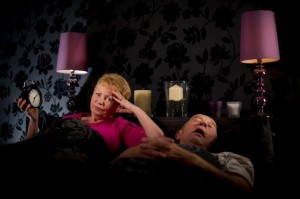 No, this isn’t a refresher course on Shakespeare and the famous Hamlet soliloquy. (Spoiler Alert – Hamlet was ranting about death, not slumber.) Do you find that despite how tired you feel, you still can’t get a full night of restful sleep? You’re not alone, because the older one becomes, the harder it is to get a good night’s sleep. Dr. Abhinav Singh, the medical director of the Indiana Sleep Center, suggests we view our sleep as if it were an older car that just doesn’t work quite as well as it once did. Ready for a tune up?
No, this isn’t a refresher course on Shakespeare and the famous Hamlet soliloquy. (Spoiler Alert – Hamlet was ranting about death, not slumber.) Do you find that despite how tired you feel, you still can’t get a full night of restful sleep? You’re not alone, because the older one becomes, the harder it is to get a good night’s sleep. Dr. Abhinav Singh, the medical director of the Indiana Sleep Center, suggests we view our sleep as if it were an older car that just doesn’t work quite as well as it once did. Ready for a tune up?
As we age…especially if you’re a woman, it takes longer to fall asleep, we may have more wakeful times throughout a night and we may make up for these by napping during the daytime. Older adults’ sleep is not as deep and rejuvenating as younger people’s sleep, and that negatively impacts our immune system, our brain’s ability to organize memories and our ability to grow or repair bones and muscle. And all of this cascades into some real health issues the older one becomes. How about you? Is it trouble falling asleep, staying asleep or just feeling refreshed when waking from a night’s sleep?
It may owe, in part, to checking out of the workforce which means we no longer have the demands or structure or early risings of work life. It also may be attributable to the loneliness or loss or just plain depression that can become part of the older brain. Older adults may also have medications for their blood pressure that give a nightly wakeup call to visit the bathroom. Women also have menopause that will exacerbate all of these elements that affect both men and women.
Here are some tips from those like Dr. Singh who have devoted a lot of focus on what can go wrong with healthy sleep and what can be done to make your sleep more … well, restful and restorative:
- Recreate a daily routine that has you waking and sleeping at the same times;
- Avoid late afternoon caffeine – my husband makes 2pm his cut-off point;
- Walk every day with a goal your phone can track…10,000 steps maybe;
- Exercise more aerobically for 40 minutes 4 to 5 times a week;
- Soak up sunshine or use a Seasonal Affective Disorder lamp daily; and
- Schedule breakfast, lunch and dinner around the same time each day.
And maximize the effectiveness of your sleep time itself by:
- Ask your doctor about CBD or melatonin or other aids to a good night’s sleep;
- Keep your phone off and away from your bedside;
- Stretch and/or do some yoga each night prior to hitting the bed;
- Replace your pillow with one that truly supports your neck and head; and
- Purchase a new mattress that supports you and doesn’t squeak.
Some folks even recommend an upgrade to your sheets or a white noise machine to cancel disruptive night sounds. Wow, that’s an exhaustive list…maybe we all can sleep better having laid all the issues to rest?
Charlotte Bishop is an Aging Life Care Advisor, Geriatric Care Manager and founder of, certified professionals who are geriatric advocates, resources, counselors and friends to older adults and their families in metropolitan Chicago. She also is the co-author of How Do I Know You? A Caregiver’s Lifesaver for Dealing with Dementia.





